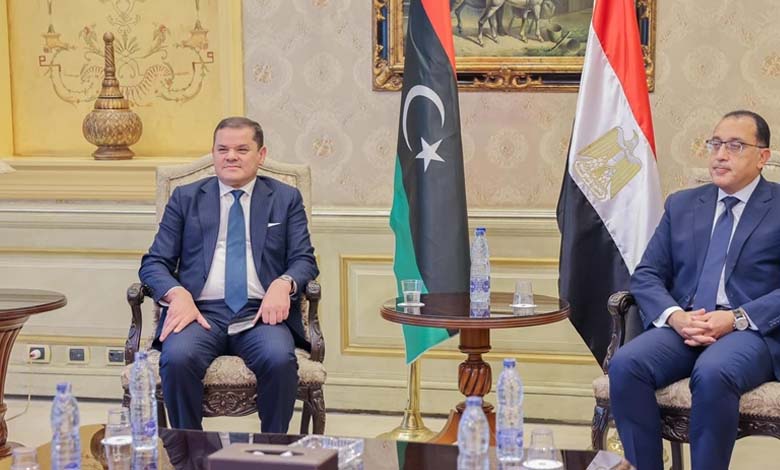Washington Backs Al-Kabir in Dispute with Dbeibah, Warns Against His Replacement
The U.S. special envoy to Libya discusses with the governor of the Libyan Central Bank the increasing threats to the safety of the bank's employees and its systems.

U.S. Special Envoy to Libya Richard Norland warned against any “attempt to replace Central Bank Governor Sadiq Al-Kabir by force” during a meeting at the U.S. Embassy in Tunis, according to a statement from the Libyan Central Bank and a post by the U.S. Embassy in Libya on the “X” platform. Relations between Al-Kabir and Prime Minister of the Government of National Unity, Abdul Hamid Dbeibah, have reached an unprecedented level of tension.
The special envoy reiterated his country’s “full support for the Central Bank of Libya in the face of these threats, and to maintain the stability of the institution so that it can fulfill its role effectively.” He stated, “I met on Monday with the Governor of the Central Bank to discuss the troubling movements of armed groups around the bank’s headquarters,” adding that “the emergence of new clashes between armed groups in recent days highlights the ongoing risks stemming from the political deadlock in Libya,” referring to the battles between armed brigades that took place last Friday in the Tajoura area, east of Tripoli, which resulted in the deaths of nine people.
-
Failure of Inter-Libyan Dialog Meeting Sparks War of Words between Dbeibah and Bachaga
-
Dbeibah after the Blinken meeting : Libya mercenaries must leave
He emphasized that “threats to the security of Central Bank employees and its operations are unacceptable,” stressing that “the integrity of the Central Bank must be protected, just like other sovereign institutions in Libya.” He also warned that “attempting to forcibly replace the bank’s leadership could lead to Libya losing access to international financial markets,” underscoring that “disputes over the distribution of Libya’s wealth must be resolved through transparent and inclusive negotiations aimed at achieving a unified budget based on consensus.”
For its part, the Central Bank of Libya stated that its governor and the U.S. envoy “discussed during their meeting in Tunis the recent developments concerning the bank and the increasing threats to its security, as well as the safety of its employees and systems.”
-
Head of Egyptian Intelligence in Tripoli and supplies for al-Dbeibah visit
-
A New Crisis in Libya Impedes Negotiations for Forming a Unified Government
The two sides discussed “the latest updates on the unified budget, the Central Bank’s efforts to rationalize spending, the unification process and maintaining state sustainability, developments in electronic payment systems, including the recent launch of the LiPay instant payment service, the economic and financial repercussions of the Sharara oil field closure, the evolving political landscape in Libya, and several other topics of mutual interest.”
Although neither the Libyan Central Bank nor the U.S. envoy specified what these threats entail, Libyan activists have recently circulated reports on social media indicating that “Libyan Presidential Council Chairman Mohamed Al-Menfi is planning to dismiss the governor with the help of military forces in the west of the country, following pressure from Abdul Hamid Dbeibah.”
-
Libya Demands Tunisia Extradite Two Individuals Involved in the Assassination of Mliqta
-
Armed Clashes in Tripoli Reveal Fragility of Security Situation
Washington holds significant influence in Libya, particularly in the western region, countering increasing Russian influence in the east, which has extended to the Libyan financial sector and has strengthened military ties with the General Command of the Libyan National Army, led by Field Marshal Khalifa Haftar—a growing concern for the U.S. administration.
The U.S. position in support of Al-Kabir comes amid internal and external pressures on Dbeibah, who faces accusations of public fund mismanagement, as well as efforts from the east to form a government that would remove him from power—an effort supported by Western forces seeking a unity government to create a favorable environment for elections.
-
Calls in Libya to Prevent Tunisian Arrest Warrant against Muslim Brotherhood Businessman
-
European-Libyan Cooperation to Secure Libyan Borders with Tunisia
Recently, relations between Dbeibah and Sadiq Al-Kabir have deteriorated. Al-Kabir appeared about a month ago for the first time in a meeting with Libyan House of Representatives Speaker Aguila Saleh, despite the latter’s repeated statements that the bank governor “had been dismissed from his position, and his continued leadership of the bank is illegitimate.”
Currently, Libya has two governments: the Government of National Unity led by Dbeibah, based in Tripoli and controlling the entire western part of the country, and the government of Osama Hammad, appointed by the House of Representatives three years ago, based in Benghazi, controlling the eastern region and several cities in the south.
-
After the arrest of a State Council Deputy in Derna… Libya’s Brotherhood obstruct solution initiatives again
-
Demands for Formation of a New Government in Libya Pose Challenges for Dbeibeh
The existence of two governments in the country has created a political crisis that Libyans hope to resolve through presidential and parliamentary elections, amid ongoing debate over the electoral laws and the executive body that will oversee the process.












